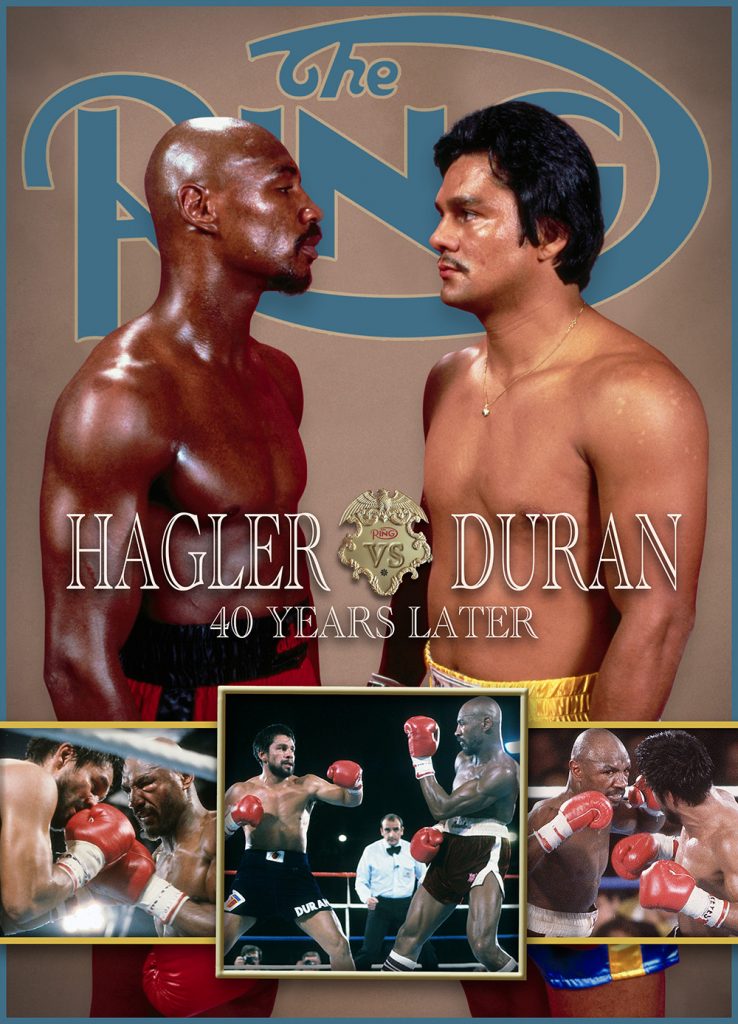A Tale of Two Tysons
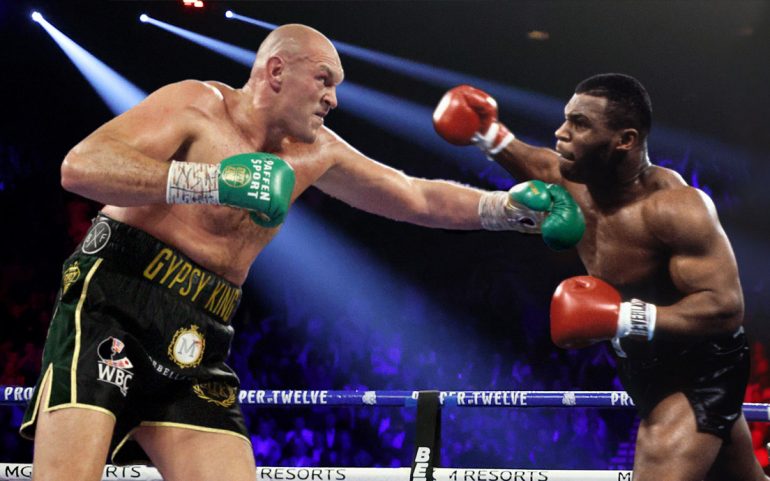
This feature originally appeared in the July 2020 issue of Ring Magazine.
“TYSON!”
The name is inextricably linked with boxing. In the same way that fistic institutions such as Muhammad Ali and, yes, Rocky conjure up images of punch-swapping for glory, the name “Tyson” will be connected to the sport forever. And now its significance is twofold.
In 1988, Mike Tyson was the undisputed heavyweight champion of the world and arguably the most famous human being on the planet. Like previous killer punchers Sonny Liston and George Foreman (during his first incarnation), “Iron Mike” wore a cloak of invincibility and instilled fear into the opposition before a punch was thrown. However, unlike Liston and Foreman, who were largely shunned by fans during their reigns, the charismatic Tyson was a global phenomenon. Non-fight fans were Tyson fans. The biggest brands in the world sought his name and likeness. He was the talk of school playgrounds. Kids named their dogs after him. And, on August 12, 1988, over 3,000 miles away from Tyson’s home city of Brooklyn, John Fury named his son after him.
“I used to watch (Mike Tyson) knock out all these guys and think to myself, ‘One day I’ll be doing that! One day I’ll be winning championships!’”
– Tyson Fury
Tyson Luke Fury was a fighter from the beginning. Born three months premature in Manchester, England, the future of the glamour division weighed in at just one pound. His chances of survival were miniscule, but his father, himself a professional fighter, was confident that his son could overcome the odds. All he needed was a strong name and the fighting heart of his Gypsy heritage.
Fast-forward over three decades and Tyson Fury is the Ring Magazine heavyweight champion (for a second time), the WBC titleholder and one of the best-known athletes in the world today. When you take a step back to look at how this story has evolved, it’s every bit as Hollywood as any Rocky script.
 Like his namesake, Tyson Fury has transcended the sport, albeit for different reasons. Outside of the ring, Fury is as intuitive as Tyson was intense. Between the ropes, he’s as elusive as Tyson was explosive. But one thing that Fury has in common with his predecessor is that he can fight like hell.
Like his namesake, Tyson Fury has transcended the sport, albeit for different reasons. Outside of the ring, Fury is as intuitive as Tyson was intense. Between the ropes, he’s as elusive as Tyson was explosive. But one thing that Fury has in common with his predecessor is that he can fight like hell.
Physically, they’re vastly different specimens. Mike Tyson is 5-foot-10 with a 71-inch reach and, at his best, he was approximately 220 pounds. The unbeaten Fury stands 6-foot-9, has an 85-inch reach and weighed in at a colossal 273 pounds for his seventh-round annihilation of Deontay Wilder in February.
Since the COVID-19 pandemic began, interest in fantasy fights has soared and fans are up for anything. Case in point: The World Boxing Super Series took to broadcasting Fight Night Champion matchups (CPU vs. CPU on a gaming console) and made a significant success out of it. Mythical matchups are almost as old as the sport itself, and they’ll be debated for as long as boxing exists. Put simply, it’s an addiction.
With this Tyson vs. Tyson matchup, The Ring was lucky enough to secure contributions from both men. The respect they have for each other is enormous, so it wasn’t possible to generate an ego-driven rivalry here. However, their respective opinions on each other’s careers and how they would hypothetically deal with an opponent who possessed the other’s strengths and weaknesses is fascinating.
Buckle up for an all-Tyson cross-generational showdown:
SUPER STRENGTHS
TYSON FURY: “What made Mike Tyson special is that he dedicated his life to the sport. In the early days, nothing else mattered except smashing people’s faces in. He had that aura about him where he was going in the ring, and people were falling over before they’d been hit. His speed was a great asset in the ring. A lot of people think it was the power, but it was the speed that did the damage. He had precision, great mobility, accuracy, and it was all in rhythm. His defense was underestimated too, because he had great footwork and head movement. All of these things combined made him a very dangerous fighter.”
MIKE TYSON: “Tyson Fury knows what he’s doing. At 6-foot-9, he’s very agile for a guy his size, and more than that, he’s smooth – real smooth. He’s like an awkward version of Floyd Mayweather (Jr.) in the ring, but regardless of the awkwardness, he’s very effective. He’s unique, eccentric. But what makes him special is more than just his fighting skills. A large part of it comes from his (Gypsy) origins, his family’s background, his father’s upbringing. It’s deeper than being a fighter; his accomplishments extend much further than just boxing.”
WHAT WEAKNESSES?
FURY: “With Mike Tyson, in the early days, his will to win was just phenomenal. It’s probably more mental than anything else when you’re in there with him. You’ve got to train hard, stand up to him, do the best you can and fight back – that’s what Buster Douglas did. Take the punishment and keep moving forward – that approach works with almost anybody. You can expose weaknesses in any fighter and, with the right game plan, any fighter can be beaten. That’s been proven time and time again.”
TYSON: “Every fighter has weaknesses, but you have to overcome them. Tyson Fury got knocked down a couple of times (by Wilder in the first fight) and that was his weakness. What did he do? He got back up and overcame it. Every fighter has a weakness and nobody’s perfect. You can fight the perfect fight, but you’re never truly perfect.”
PEAK PERFORMANCES
FURY: “I used to watch Mike Tyson’s videotapes when I was young. I really loved him because he was a very exciting fighter, very entertaining, and he was inspirational. I used to watch him knock out all these guys and think to myself, ‘One day I’ll be doing that! One day I’ll be winning championships!’
“I remember watching the (Trevor) Berbick fight, his first world championship (win), and Berbick kept falling because his brain was saying, ‘Get up,’ but his legs wouldn’t allow it. I remember big Frank (Bruno) putting up a valid challenge. He caught Mike Tyson with a good shot once and was very brave but, ultimately, he got beat. I remember the fights with Razor Ruddock; they were great fights. Francois Botha, Lennox Lewis. People will say Lennox Lewis’ best win is Mike Tyson, but that wasn’t the Mike Tyson from the ’80s.”
TYSON: “I was a little worried for Tyson in both Deontay Wilder fights, even though I felt he’d pull out the victories. (Wilder) was throwing hard, hard punches, and he was throwing them fast. I was like, ‘Damn!!!!’ But Tyson fought totally differently in that second fight. When Deontay couldn’t knock him out or hit him with those murderous punches, he became a little discouraged, and Tyson just opened up on him. He became more and more confident, threw everything he had, and the guy just cracked.
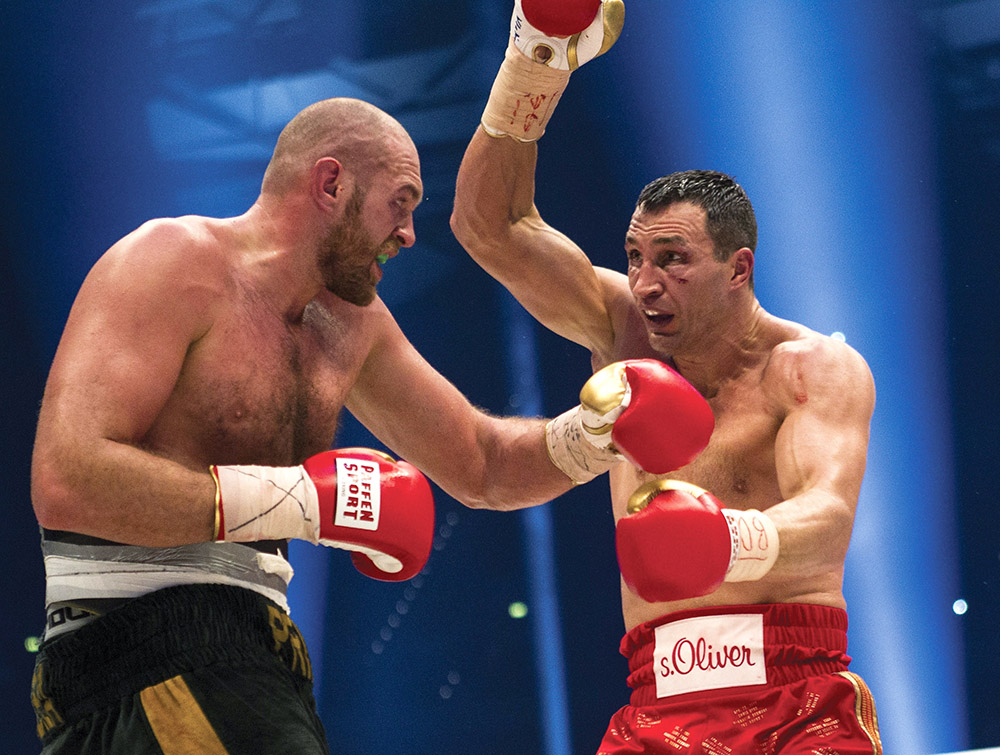
Fury’s awkwardness is one of his strengths, says Tyson. (Photo by Marianne Mueller/Anadolu Agency/Getty Images)
“I thought Wladimir Klitschko would beat Tyson Fury. We’re talking about a very technical, hard puncher with an Eastern European style. But again Tyson surprised me. After Klitschko, when he had the layoff, I wasn’t sure if he’d come back again. But sometimes, and I know this sounds crazy, champions need to feel sorry for themselves and that motivates us. Feeling sorry for ourselves motivates us to get out of the doldrums. We’re down, the world hates us, nobody believes in us, but we become motivated to prove the world wrong. That’s a big thing for Tyson. Gypsies have been downtrodden and mistreated from the beginning of time, but now they’ve got the heavyweight champion of the world and that’s amazing – he’s a hero.”
DOES SIZE MATTER?
FURY: “There’s different ways of looking at height. If you’re really tall, like I am, then you can use that to your advantage. Or you can be really small and use that to your advantage, like Mike did. But you’re either punching up or punching down, and both are dangerous. But it would be ridiculous to compare Mike Tyson to Deontay Wilder or Anthony Joshua. He would have walked straight to Wilder, hit him once and absolutely poleaxed him, and Joshua even quicker. Why? Because those fellas have no defense, and he’d just walk straight to guys like that. Mike Tyson, with his angles, would have sorted them.”
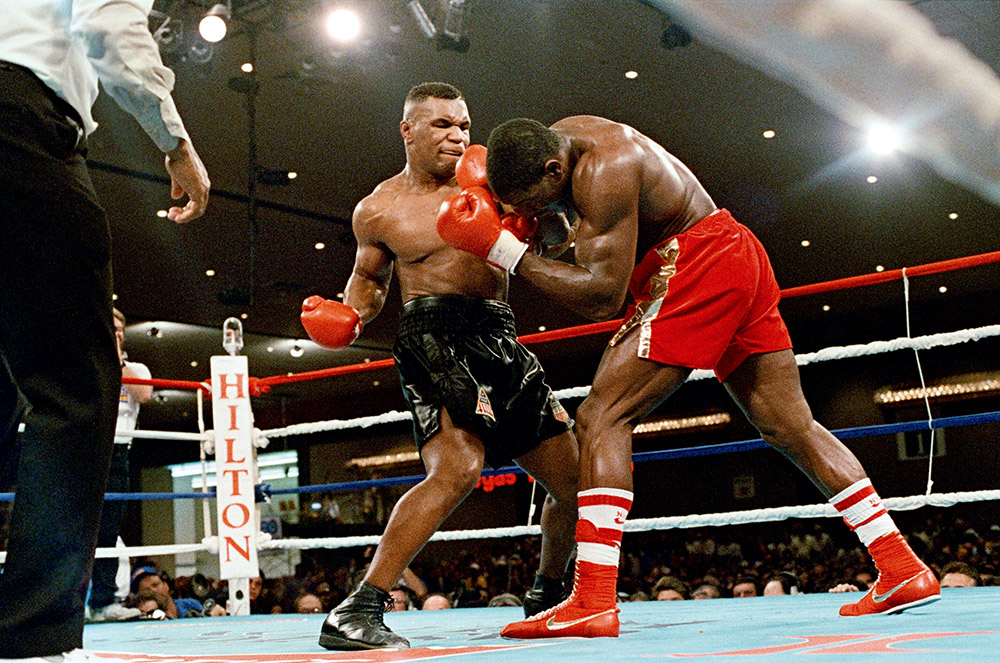
Tyson’s first battle with Frank Bruno inspired a young Fury. (Photo by Brendan Monks/Daily Mirror/Mirrorpix/Getty Images)
TYSON: “Over a hundred years ago, (former heavyweight champion) Tommy Burns proved that size doesn’t matter. Burns was 5-foot-7 and outjabbed guys over six feet. He was one of the greatest fighters of all time and very underrated. Tommy Burns brought so much to boxing and proved that shorter guys can outbox bigger and stronger guys.”
TYSON VERSUS TYSON
FURY: “To be honest, I don’t like matching fighters from the past with current fighters. I don’t like to pit myself against boxing heroes in a virtual reality fight, because I find it disrespectful. But my answer is that I’ll beat any man born from his mother. I just wouldn’t say that directly about any of the heroes from the past. But, deep down, I don’t believe that any fighter from the past can beat me. I think I’m the greatest fighter that’s ever lived – from any generation. Plus, I don’t get intimidated – all of the intimidation factors that would have worked with Joshua and Wilder wouldn’t work with me. On the night, no matter who they are, when they’re in that ring, they’re just men with gloves on – just like me.”
TYSON: “Against someone of Tyson Fury’s size, you’ve got to be aggressive, move your head and be elusive, because if you stand still against a man that size, you’re an easy target. You need to attack, use angles and stay away from his punching distance. You need to be close, but you can’t stay at a distance that allows the bigger fighter to get off. The thing about it is, Tyson adapts, and that’s what we saw in the last fight. Everyone thought Wilder would be more confident because he’d scored two knockdowns in the first fight. And they weren’t flash knockdowns; they were brutal knockout-type knockdowns. The world expected Wilder to be more confident, but it was the other way around. A lot of people don’t understand that size and style isn’t the most important thing in the ring; it’s the morale of a fighter that leads to victory. His determination, his will to win, his desire is what makes him a champion. But at my best, I thought I was the greatest fighter from Achilles, through the Art of War, since the beginning of God, since the beginning of time – I was invincible. And if there are other fighters out there that don’t think that way, then they have a problem.”
OUTSIDE OF THE RING
FURY: “We have a good connection. I find Mike to be a really decent person – a really nice, down-to-earth bloke. He’s had a very, very tough life. A lot of good things have happened and a lot of bad things have happened, but he’s learned from his experiences. He’s become very mature; he’s doing different things now, and he should be congratulated for overcoming all the things that he has. We’re similar in that we’ve endured tough times; we’ve both been down and picked ourselves up again. We both know what it’s like to have everything, and we both know what it’s like to have nothing. I think he’s struggled with mental health problems, like myself, and that’s a day-to-day battle.

Fury’s got his idol’s endorsement as the best heavyweight. (Photo by Bradley Collyer/PA Images via Getty Images)
“An amazing thing happened when I was in Las Vegas. Before I went into training camp (for the Wilder rematch), I took Paris and the kids there for Christmas and New Year. We were in a mall and there was a sign saying that Mike Tyson would be at this sports memorabilia place, and it was just about to start. I went in with the family and said, ‘I’m here to see Mike,’ went around this curtain and shouted ‘Mike!!!!’ He sees me and yells, ‘Ohhhhhh, the champ’s here!’ It was such an amazing moment; he stopped everything that he was doing, came out and gave me a big hug. I introduced him to the family and said, ‘Can I get a picture with you and my kids?’ He’s like, ‘Sure, champ!’ It was just such a great moment. To think that I’d watched him as a child, one of my heroes, and now he’s coming up to embrace me and telling everyone, ‘The champ’s here!’ That is a surreal moment that I’ll never, ever forget.”
TYSON: “Please thank Tyson for telling that story. I remember something similar when I met Sugar Ray Robinson. I was 18 years old and we were at the (1984) Olympic Games in Los Angeles. Sugar Ray said, ‘Make sure you’re in shape,’ so I went out and ran 10 miles that day. He just had to say that one sentence. He was such a hero of mine, and if he wasn’t the greatest fighter that ever lived, then he’s the greatest imitation of it.
“With Tyson, if he didn’t go through everything he’s been through, he wouldn’t be the person that he is today. The mental health issues? That’s why he’s the greatest, because he’s sick, and that’s being real. People want him to be normal. Yeah, be normal and go on the fuckin’ welfare line. Tyson doesn’t know what normal is. Tell him to stay the fuck away from normal; he wasn’t meant to be normal.”
***
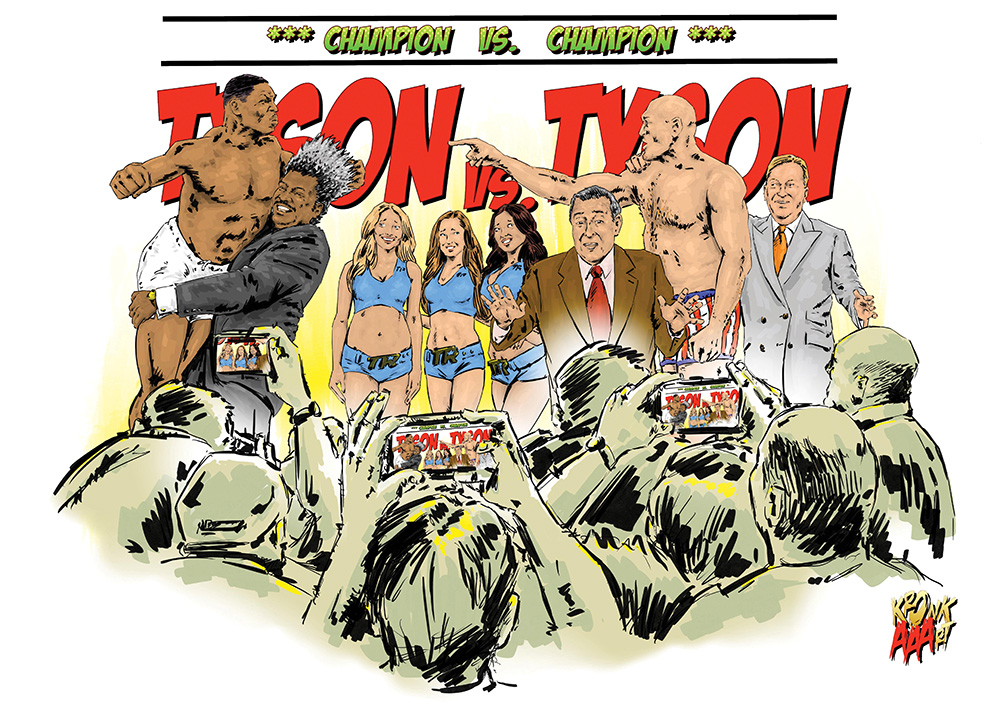
In the final analysis, a prime Mike Tyson’s irresistible mix of explosiveness, elusiveness, speed and power would be a deadly threat in any era, including today’s land of the giants. When Tyson referenced Tommy Burns, the shortest heavyweight champion in history, that tells you just how confident he would be in taking down today’s fighters in his prime. He once said on HBO that “jabbing is all about timing. You can be 5-foot-6 and outjab someone 6-foot-2.”
“I understand what he’s saying, for sure,” Fury admitted. “Size doesn’t really matter if you’re brilliant, as Floyd Mayweather has proved. Then again, there’s the old saying: ‘A good big one will always beat a good little one.’ That’s been proved time and time again. ‘Oh, he could have done something if he was bigger!’ ‘Oh, that guy was way too big for him; they look like they’re from different weight categories.’ I’ve watched boxing all my life, and people always say these things.
“I’m blessed by God, and I’m gifted. I’ve seen many athletes: footballers, basketball players, wrestlers. There are big athletic guys out there, but they haven’t got the footwork, the agility, the movement that I’ve got. Even LeBron James, I don’t think he has the movement that I have, and he’s not as big as me, he’s not as heavy as me. I’m naturally gifted as a boxer and a mover. I’ve got skinny little racehorse’s legs and I’m built for speed, movement and agility. You don’t train that or do anything with it. I’m blessed – it’s a gift.”
And that’s what’s crucial here – Fury isn’t all about size. His mobility and athleticism for a man of his dimensions are truly remarkable, and the heavyweight division has seen nothing like him. In the 1960s, Ali, at 212 pounds, was lauded for his athleticism and grace. Fury might not look as beautiful as Ali moving around the ring, but he’s 50-60 pounds heavier and extremely effective.
Tyson himself acknowledged that Fury’s movement and defensive finesse will also cause problems for the only elite-level heavyweight that he has yet to face.
“I love Anthony Joshua, but a fight with Tyson Fury is going to be interesting when it happens,” said the former champion without prompting. “(Previous Joshua opponent Wladimir) Klitschko doesn’t move as well as Fury does. Klitschko moves with his legs, whereas Fury is moving right in front of you and hitting you with punches. If that fight comes off, Joshua will need to attack the body, because he’s not going to hit him to the head. And if he hits him once, he’s not going to hit him a second time.
“Can you imagine that fight in the U.K.? The stadiums over there won’t be big enough!”
Had Mike Tyson and Tyson Fury faced off in their respective primes – in any country – the promoters would have had the very same problem.
Tom Gray is Associate Editor for Ring Magazine. Follow him on Twitter: @Tom_Gray_Boxing.
SUBSCRIBE NOW (CLICK HERE - JUST $1.99 PER MONTH) TO READ THE LATEST ISSUE
